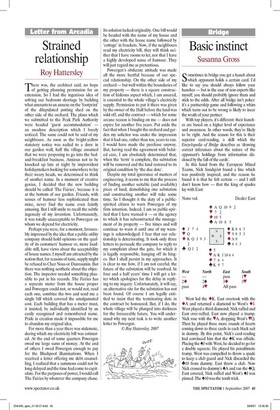Strained relationship
Roy Hattersley There was, the architect said, no hope of getting planning permission for an extension. So I had the ingenious idea of solving our bedroom shortage by building what amounts to an annexe on the `footprint' of the dilapidated potting shed on the other side of the orchard. The plans which we submitted to the Peak Park Authority were headed 'guest accommodation' — an anodyne description which I barely noticed. The same could not be said of my neighbours. As soon as the bright-yellow statutory notice was nailed to a door in our garden wall, half the village assumed that we were proposing to go into the bedand-breakfast business. Anxious not to be knocked up late at night by improvident holidaymakers looking for somewhere to lay their weary heads, we determined to think of another name. In a moment of creative genius, I decided that the new building should be called 'The Fairies', because it is at the bottom of our garden. Friends, with senses of humour less sophisticated than mine, never find the name even faintly amusing. But I still smile to recall the subtle ingenuity of my invention. Unfortunately, it was totally unacceptable to Powergen on whom we depend for electricity.
Perhaps you were, for a moment, favourably impressed by the idea that a public utility company should hold opinions on the quality of its customers' humour or, more laudable still, have views about the acceptability of house names. I myself am attracted by the notion that, for reasons of taste, supply might be refused to Chez Nous or Dunroamin. But there was nothing aesthetic about the objection. The inspector needed something plausible to put in his records. The Fairies has a separate meter from the house proper and Powergen could not, or would not, read each one, combine the two and send me a single bill which covered the amalgamated cost. Each building that has a meter must, it insisted, be individually identified by an easily recognised and remembered name. Pride in creation made it impossible for me to abandon my original idea.
For more than a year there was stalemate, during which my electricity bill was estimated. At the end of some quarters Powergen owed me large sums of money. At the end of others I owed Powergen enough to pay for the Blackpool illuminations. When I received a letter offering me debt counselling, I realised that a summons could not be long delayed and the time had come to capitulate. For the purposes of power, I would call The Fairies by whatever the company chose.
Its solution lacked originality. One bill would be headed with the name of my house and the other with the house name followed by 'cottage' in brackets. Now, if the neighbours read my electricity bill, they will think neither that I have rooms to let, nor that I have a highly developed sense of humour. They will just regard me as pretentious.
Powergen's obdurate attitude was made all the more hurtful because of our special relationship. On the other side of my orchard — but well within the boundaries of my property — there is a square construction of hideous aspect which, I am assured, is essential to the whole village's electricity supply. Permission to put it there was given by the owner of the Hall before the land was sold off, and the contract — which for some arcane reason is binding on me — does not expire for another five years. Put aside the fact that when I bought the orchard and garden my solicitor was under the impression that it had one, rather than ten, years to run. I would have made the purchase anyway. But, having read the agreement with belated care, I am absolutely determined that, when the `term' is complete, the substation will be removed and the land restored to its original condition by `the due date'.
Despite my total ignorance of matters of engineering, it seems to me that the process of finding another suitable (and available) piece of land, demolishing one substation and constructing another will take some time. So I thought it the duty of a publicspirited citizen to warn Powergen of my firm intention. Indeed, I am so public-spirited that I have warned it — or the agency to which it has subcontracted the management of its property — five times and will continue to warn it until one of my warnings is acknowledged. I fear that our relationship is deteriorating. It took only three letters to persuade the company to reply to my complaint about the gate, for which it is legally responsible, hanging off its hinges. But I shall persist in my approaches. It is clear to me how, if I am not careful, the future of the substation will be resolved. In four and a half years' time I will get a letter which apologises for the delay in replying to my inquiry. Unfortunately, it will say, an alternative site for the substation has not been found. Of course I am legally entitled to insist that the terminating date in the contract be honoured. But, if I do, the whole village will be plunged into darkness for the foreseeable future. You will understand why my next task is to write another letter to Powergen.
Roy Hattersley, 2007







































 Previous page
Previous page